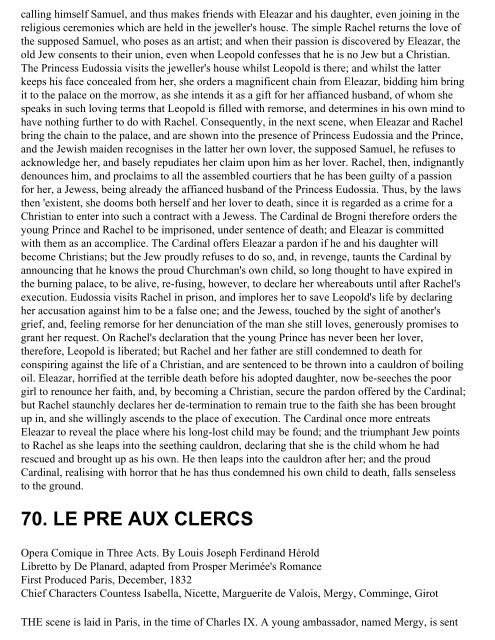Opera Plots I - MDC Faculty Home Pages
Opera Plots I - MDC Faculty Home Pages
Opera Plots I - MDC Faculty Home Pages
You also want an ePaper? Increase the reach of your titles
YUMPU automatically turns print PDFs into web optimized ePapers that Google loves.
calling himself Samuel, and thus makes friends with Eleazar and his daughter, even joining in the<br />
religious ceremonies which are held in the jeweller's house. The simple Rachel returns the love of<br />
the supposed Samuel, who poses as an artist; and when their passion is discovered by Eleazar, the<br />
old Jew consents to their union, even when Leopold confesses that he is no Jew but a Christian.<br />
The Princess Eudossia visits the jeweller's house whilst Leopold is there; and whilst the latter<br />
keeps his face concealed from her, she orders a magnificent chain from Eleazar, bidding him bring<br />
it to the palace on the morrow, as she intends it as a gift for her affianced husband, of whom she<br />
speaks in such loving terms that Leopold is filled with remorse, and determines in his own mind to<br />
have nothing further to do with Rachel. Consequently, in the next scene, when Eleazar and Rachel<br />
bring the chain to the palace, and are shown into the presence of Princess Eudossia and the Prince,<br />
and the Jewish maiden recognises in the latter her own lover, the supposed Samuel, he refuses to<br />
acknowledge her, and basely repudiates her claim upon him as her lover. Rachel, then, indignantly<br />
denounces him, and proclaims to all the assembled courtiers that he has been guilty of a passion<br />
for her, a Jewess, being already the affianced husband of the Princess Eudossia. Thus, by the laws<br />
then 'existent, she dooms both herself and her lover to death, since it is regarded as a crime for a<br />
Christian to enter into such a contract with a Jewess. The Cardinal de Brogni therefore orders the<br />
young Prince and Rachel to be imprisoned, under sentence of death; and Eleazar is committed<br />
with them as an accomplice. The Cardinal offers Eleazar a pardon if he and his daughter will<br />
become Christians; but the Jew proudly refuses to do so, and, in revenge, taunts the Cardinal by<br />
announcing that he knows the proud Churchman's own child, so long thought to have expired in<br />
the burning palace, to be alive, re-fusing, however, to declare her whereabouts until after Rachel's<br />
execution. Eudossia visits Rachel in prison, and implores her to save Leopold's life by declaring<br />
her accusation against him to be a false one; and the Jewess, touched by the sight of another's<br />
grief, and, feeling remorse for her denunciation of the man she still loves, generously promises to<br />
grant her request. On Rachel's declaration that the young Prince has never been her lover,<br />
therefore, Leopold is liberated; but Rachel and her father are still condemned to death for<br />
conspiring against the life of a Christian, and are sentenced to be thrown into a cauldron of boiling<br />
oil. Eleazar, horrified at the terrible death before his adopted daughter, now be-seeches the poor<br />
girl to renounce her faith, and, by becoming a Christian, secure the pardon offered by the Cardinal;<br />
but Rachel staunchly declares her de-termination to remain true to the faith she has been brought<br />
up in, and she willingly ascends to the place of execution. The Cardinal once more entreats<br />
Eleazar to reveal the place where his long-lost child may be found; and the triumphant Jew points<br />
to Rachel as she leaps into the seething cauldron, declaring that she is the child whom he had<br />
rescued and brought up as his own. He then leaps into the cauldron after her; and the proud<br />
Cardinal, realising with horror that he has thus condemned his own child to death, falls senseless<br />
to the ground.<br />
70. LE PRE AUX CLERCS<br />
<strong>Opera</strong> Comique in Three Acts. By Louis Joseph Ferdinand Hérold<br />
Libretto by De Planard, adapted from Prosper Merimée's Romance<br />
First Produced Paris, December, 1832<br />
Chief Characters Countess Isabella, Nicette, Marguerite de Valois, Mergy, Comminge, Girot<br />
THE scene is laid in Paris, in the time of Charles IX. A young ambassador, named Mergy, is sent













